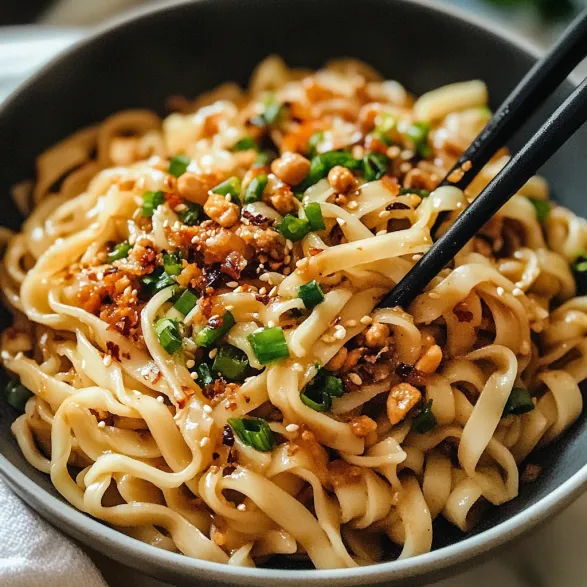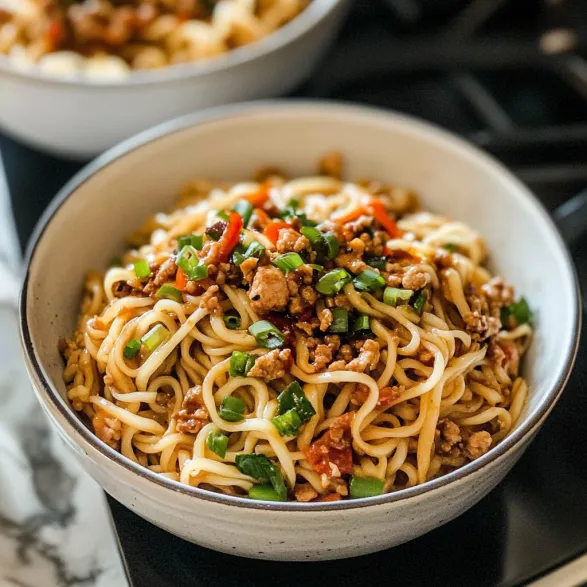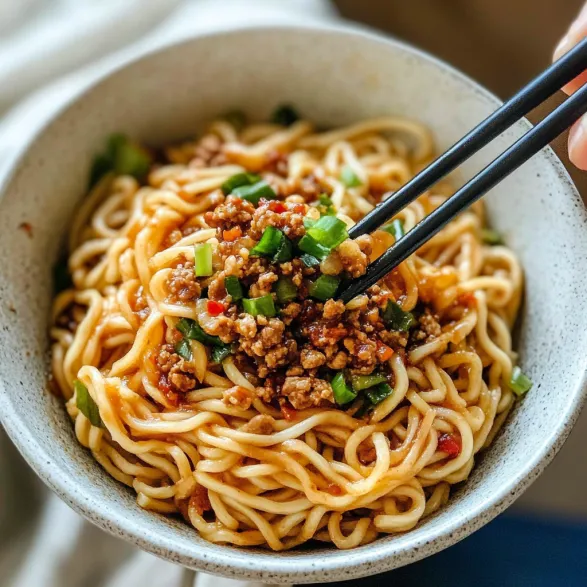 Bookmark
Bookmark
This bold and slurp-worthy Chinese classic delivers serious flavor — and fast. Dan Dan Noodles are all about the contrast: spicy and nutty, savory and just a little sweet, chewy noodles topped with crispy ground pork and a slick of chili oil. It's the kind of dish you'd swear came from your favorite Sichuan spot, but it comes together in under 30 minutes in your own kitchen.
I first discovered Dan Dan noodles during a freezing winter night when I was craving something warming yet exciting. After one bite, my family declared it our new comfort food tradition. Now it's our go-to weeknight meal when we need something soul-satisfying but don't have hours to spend in the kitchen.
Ingredients
- For the Pork Topping: Vegetable oil creates the perfect foundation for crispy pork
- Ground pork the traditional protein that crisps up beautifully
- Garlic cloves fresh minced adds aromatic punch
- Fresh ginger adds warmth and brightens the meat mixture
- Soy sauce brings umami depth to the pork
- Rice vinegar balances with gentle acidity
- Hoisin sauce adds that sweet and savory complexity
- For the Sauce: Tahini or Chinese sesame paste the nutty foundation that makes this dish special
- Soy sauce provides that crucial savory backbone
- Chinese black vinegar authentic tang that elevates the whole dish
- Chili oil the signature heat component that defines Dan Dan noodles
- Sugar just enough to balance all the bold flavors
- Garlic another layer of aromatic intensity
- Hot water helps create the perfect pourable consistency
- For the Noodles: Chinese wheat noodles authentic choice with perfect chew
- Salt for the water properly seasoned noodles make all the difference
- To Serve: Chopped scallions fresh green bite and color
- Crushed peanuts or sesame seeds essential textural contrast
- Extra chili oil for heat lovers who want more kick
Step-by-Step Instructions
- Cook the Pork
- Heat your vegetable oil in a skillet over medium heat until it shimmers slightly. Add the ground pork and spread it out evenly in the pan. Let it cook undisturbed for about 2 minutes before breaking it up with a wooden spoon. Continue cooking for about 5 minutes total until you see crispy brown edges forming. The goal is not just cooked pork but deliciously crispy bits. Add your minced garlic and grated ginger, stirring constantly for 30 seconds until fragrant but not burned. Pour in soy sauce, rice vinegar, and hoisin, which will sizzle immediately. Stir everything to coat the meat and let it caramelize slightly for another 2 minutes. The mixture should look glossy and smell incredible. Remove from heat while you prepare the other components.
- Make the Sauce
- In a medium bowl, add your tahini or Chinese sesame paste first. The thick paste needs to be loosened before adding other ingredients. Add soy sauce, vinegar, chili oil, sugar, and minced garlic to the bowl. Begin whisking these ingredients together. The mixture will initially look separated and grainy. This is normal. While continuing to whisk, slowly drizzle in hot water a little at a time. The transformation is magical as the sauce becomes silky smooth and turns a beautiful light tan color. Keep whisking until no lumps remain and the sauce easily coats the back of a spoon. Taste and adjust seasoning if needed.
- Cook the Noodles
- Bring a large pot of water to a rolling boil. Add a generous tablespoon of salt to the water. This flavors the noodles from within. Add your Chinese wheat noodles to the boiling water and stir immediately to prevent sticking. Cook according to package directions, but start checking about 1 minute before the suggested time. You want them tender but still with a pleasant chew. Perfectly cooked noodles should have resistance when bitten but no hard center. When done, drain thoroughly in a colander but do not rinse. The starchy exterior helps the sauce cling to each strand.
- Assemble
- Working quickly while everything is hot, divide your cooked noodles between serving bowls, gently twirling them with chopsticks or tongs to create a nest. Pour the prepared sauce evenly over each portion of noodles, allowing it to seep down into the strands. Spoon the crispy pork mixture on top of each bowl, making sure to get both meat and the flavorful oils. Scatter freshly chopped scallions over everything, focusing on a generous amount. Add a sprinkling of crushed peanuts or sesame seeds for that essential crunch. For heat lovers, drizzle additional chili oil in a decorative pattern across the top.
 Bookmark
Bookmark
My absolute favorite moment with this dish was watching my spice-shy mother-in-law take her first tentative bite, then immediately go back for more with wide eyes. The sesame paste is truly the magic ingredient here. I've found that while tahini works in a pinch, tracking down real Chinese sesame paste with its deeper, toastier flavor takes this dish from great to unforgettable.
The History Behind Dan Dan Noodles
Dan Dan Noodles originated in Sichuan province, where street vendors would carry bamboo poles with baskets of noodles and sauce on either end. "Dan" refers to these carrying poles. The vendors would set down their poles when a customer ordered, quickly assembling the dish on the spot. What began as humble street food has become one of the most beloved and recognized Sichuan dishes worldwide. Traditional versions feature preserved vegetables and sometimes Sichuan peppercorns for their signature numbing quality. My version maintains the spirit while adapting to ingredients more readily available in Western kitchens.
Substitutions That Work
Don't panic if you're missing an ingredient or two. Ground turkey or chicken can replace pork, though you might want to add a touch more oil since they're leaner. No Chinese black vinegar? Balsamic vinegar provides a reasonable approximation of its complex flavor. Regular spaghetti works surprisingly well if you can't find Chinese wheat noodles. Just cook them very al dente to mimic the traditional chewy texture. For a vegetarian version, substitute the meat with chopped shiitake mushrooms and crumbled firm tofu cooked until crispy.
Serving Suggestions
While Dan Dan noodles are a complete meal on their own, they pair beautifully with simple sides. A quick cucumber salad dressed with rice vinegar and a touch of sugar provides cool contrast to the spicy noodles. For a more substantial spread, serve alongside steamed dumplings or spring rolls. If entertaining, present the components separately and let guests build their own bowls. This creates an interactive dining experience and allows everyone to adjust spice levels to their preference. A cold light beer or iced jasmine tea makes the perfect beverage pairing to cut through the richness.
 Bookmark
Bookmark
Frequently Asked Questions About Recipes
- → What can I substitute for Chinese black vinegar?
If you can't find Chinese black vinegar (Chinkiang vinegar), rice vinegar makes the best substitute. For closer flavor, you can add a few drops of Worcestershire sauce to rice vinegar. In a pinch, a mix of balsamic vinegar and rice vinegar can also work, though it will slightly alter the authentic taste profile.
- → Is there a vegetarian version of Dan Dan Noodles?
Absolutely! For a vegetarian Dan Dan Noodles, replace the ground pork with crumbled firm tofu, chopped mushrooms (shiitake work especially well), or a plant-based meat substitute. Season the vegetarian protein exactly as you would the pork for similar flavor development. Everything else in the preparation remains the same.
- → How spicy are authentic Dan Dan Noodles?
Traditional Sichuan Dan Dan Noodles are moderately to significantly spicy. However, you can easily adjust the heat level by controlling the amount of chili oil added. Start with less if you're sensitive to heat, and add more to taste. The dish should still have some warmth to be authentic, but can be adapted to your preference.
- → Can I prepare any components ahead of time?
Yes! The sauce and pork topping can both be prepared up to 2 days in advance and stored in the refrigerator. This makes assembly very quick when you're ready to eat - simply cook fresh noodles and combine with your pre-made components. Just be sure to warm the sauce slightly before mixing with hot noodles for the best texture.
- → What type of noodles work best for Dan Dan?
Traditional Dan Dan Noodles use medium-thickness Chinese wheat noodles. Look for fresh or dried Chinese noodles labeled as 'medium' or 'ramen-style' in Asian grocery stores. In a pinch, spaghetti or linguine make acceptable substitutes, though they lack the characteristic chew of traditional Chinese wheat noodles. Avoid rice noodles, as they don't provide the right texture for this dish.
- → How do you properly mix Dan Dan Noodles before eating?
The proper way to enjoy Dan Dan Noodles is to thoroughly toss everything together in your bowl before eating. This ensures the sauce coats every noodle and the flavors meld properly. Use chopsticks to lift and turn the noodles several times, bringing the toppings and sauce from the bottom of the bowl. This mixing action is essential for experiencing the full flavor profile as intended.
